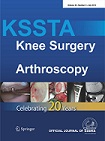
Sports Medicine
Bupivacaine and ropivacaine provide short duration pain reduction after knee arthroscopy
This report has been verified
by one or more authors of the
original publication.
Knee Surg Sports Traumatol Arthrosc. 2012 Feb;20(2):239-44. doi: 10.1007/s00167-011-1562-5. Epub 2011 Jun 1
282 patients scheduled for knee arthroscopy were randomized to compare the analgesic effects of two different anesthetics to a placebo. Patients received bupivacaine, ropivacaine, or NaCl (control). Results at 1 h postoperatively revealed that treatment with bupivacaine or ropivacaine led to better pain reduction when compared to the control treatment. However, no differences in pain were observed between the groups after 4h, indicating a short duration of the anesthetic effects. The small benefits of these treatments make it hard to justify this analgesic modality following knee arthroscopy, due to the possible chondrotoxic effect of bupivacaine and ropivacaine.
Unlock the full article
Get unlimited access to OrthoEvidence with a free trial
Start TrialCritical appraisals of the latest, high-impact randomized controlled trials and systematic reviews in orthopaedics
Access to OrthoEvidence podcast content, including collaborations with the Journal of Bone and Joint Surgery, interviews with internationally recognized surgeons, and roundtable discussions on orthopaedic news and topics
Subscription to The Pulse, a twice-weekly evidence-based newsletter designed to help you make better clinical decisions
Exclusive access to original content articles, including in-house systematic reviews, and articles on health research methods and hot orthopaedic topics
Or continue reading this full article
Register Now

Subscribe to "The Pulse"
Evidence-Based Orthopaedics direct to your inbox.





































